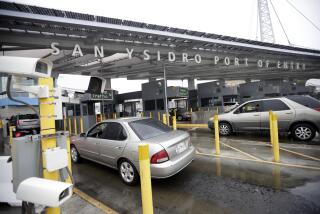Verdict Spells End to Oft-Abused Car Subleases : Courts: Lake Forest man’s conviction effectively ends the practice of matching poor credit risks with those trying to sell vehicles on which they owe money.
- Share via
SANTA ANA — In the first court test of a 1988 state law that effectively outlawed a once-booming and often-abused business, an Orange County man has been convicted on seven felony counts of illegal automobile subleasing.
The state Department of Motor Vehicles investigator who developed the case against Thomas Charles Carter said that Thursday’s verdict squelched the hope of some former subleasing agents that their business could be revived.
Carter, 41, a Lake Forest resident who owned U.S. Financial, a Santa Ana subleasing business, faces up to seven years in prison and $70,000 in fines when he is sentenced in Orange County Superior Court on Jan. 22.
Neither Carter nor his attorney could be reached for comment.
Two other defendants in the case remain fugitives. A fourth, Steven Anthony Drapeau of La Mirada, was sentenced Friday. Drapeau previously pleaded guilty to a single felony count of illegal subleasing. The charge was reduced to a misdemeanor because of his cooperation in testifying against Carter, Deputy Dist. Atty. James Coulter said.
Carter was found guilty after a two-day jury trial in which the defense sought to invalidate a key section of the law that makes it illegal for a third party to arrange a motor vehicle sublease without the lender’s consent.
Most lenders prohibit subleasing of vehicles they have financed, and continue to hold the original borrower responsible for paying off the loan.
The last subleasing firm in Orange County was closed in 1991 after a five-year campaign against the businesses by the DMV.
The subleasing agencies usually matched people with low incomes or poor credit records with people who were trying to sell cars or trucks on which they still owed money.
The companies generally promised to find loans for the would-be buyers and arranged for them to sublease the vehicles from the registered owners until the loan was funded.
Prospective buyers were charged substantial fees--as much as $5,000--and the subleasing companies promised that a portion of the fee would be used as a down payment to help secure the loan. The registered owners were assured that the new sublease clients would assume responsibility for the monthly car payments. But in many cases the loans promised to the buyers never materialized, and the sellers found themselves in trouble with their banks because the sublease clients had stopped making payments.
Rande King, the Irvine-based DMV investigator who built cases against a number of subleasing operations in Southern California, said many car owners had their cars repossessed after the sublease customers quit making payments. In one case, King found that a sublease customer had made only one payment, and then abandoned the car after the engine blew up.
It was because of such abuses that the DMV and state attorney general’s office pushed for the 1988 law that made many subleasing activities illegal.
King said the Carter verdict should end efforts to resurrect the business.
“We believe there are a lot of these guys sitting on the sidelines, hoping that Carter would not be convicted so they could start up again,” he said. “This is the first sublease case in the state that has gone all the way to trial. . . . The conviction means that the law stands, and we will be enforcing it to the max.”
In the more than two years since Carter was arrested, at least four constitutional challenges to the anti-subleasing law have been rejected by Orange County Superior Court judges.
In the trial this week, Judge Kathleen E. O’Leary refused to consider arguments by Carter’s attorney that Carter was simply acting as an agent for his clients, and that it was the clients who arranged the transactions, Coulter, the deputy district attorney, said.
Carter was arrested in June, 1990, along with several associates and charged with violating the new state law by acting as middleman in at least 20 subleasing transactions and by keeping money that the would-be buyers had deposited to be used for their down payments.
The original grand theft charges were dropped “to simplify the case and the prosecution,” King said.
More to Read
Sign up for Essential California
The most important California stories and recommendations in your inbox every morning.
You may occasionally receive promotional content from the Los Angeles Times.









